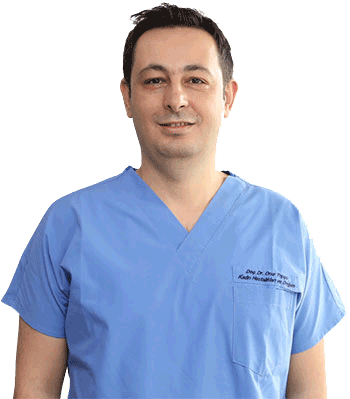
Prof. Dr. Onur Topçu
Gynecology and Obstetrics Specialist
What is Intestinal Endometriosis?
Endometriosis disease is more commonly known as chocolate cyst. However, endometriosis disease can affect all organs in the abdomen and cause complaints depending on the organ it affects. As a physician who specializes in endometriosis and has worked to increase awareness of this disease, I would like to tell you about intestinal endometriosis.
Intestinal endometriosis is a condition in which the endometrium, the inner lining of the uterus, appears outside of the places where it should normally be in the uterus, usually in the intestines and sometimes in surrounding organs. This condition can lead to painful lesions as endometrial tissue begins to bleed and shed during the menstrual cycle. Intestinal endometriosis can often cause symptoms such as severe abdominal pain during menstrual periods, constipation, diarrhea, bloody stools and pain during bowel movements.
How is intestinal endometriosis diagnosed?
Various methods can be used to diagnose intestinal endometriosis. Here are some of them:
Physical Exam: Your doctor may perform a physical exam to evaluate symptoms and check for tenderness in the pelvic area.
Imaging Tests:
Ultrasonography: Pelvic ultrasonography can be used to detect lesions.
MRI (Magnetic Resonance) Imaging: Can be used to show intestinal endometriosis as well as affected areas in surrounding organs in more detail.
Colonoscopy: Colonoscopy is rarely helpful in diagnosing intestinal endometriosis. Because only 4% of patients with intestinal endometriosis have lesions in the intestinal lumen.
How is intestinal endometriosis treated?
Treatment for intestinal endometriosis is often individualized depending on the severity of symptoms, the patient’s age, general health, and future plans to have children. Here are some methods used in this treatment process:
Medication:
Painkillers: Can be used to relieve pain.
Anti-Inflammatory Drugs (NSAIDs): Can reduce inflammation and control pain.
Hormonal Treatments: Hormonal treatments can reduce the growth of endometrial tissue and bleeding by controlling the menstrual cycle. These treatments may include birth control pills, progesterone-containing medications, or GnRH agonists.
Surgical intervention:
Laparoscopy: It is a minimally invasive surgical method used to remove endometriosis lesions.
Intestinal Resection: In severe cases of intestinal endometriosis, surgical removal of affected sections of bowel may be required.
Supportive Treatments:
Physical Therapy: Can be used to relieve pelvic pain and strengthen muscles.
Diet and Exercise: Maintaining a healthy lifestyle can improve overall health and relieve symptoms.
Assoc. Dr. H. Onur Topçu
Gynecology & Obstetrics-In Vitro Fertilization and Advanced Gynecological Endoscopy Specialist
PATIENT COMMENTS
Hello, my illness, which could not be diagnosed for 1 year, was finally diagnosed as endometriosis. Fortunately, a doctor I went to for a check-up discovered that I was suffering from endometriosis, and since the doctor was not an expert in his field, he said he would send you to a specialist and I found myself in Onur Hodja’s clinic the next day. They had previously told me that I had stenosis in my intestine, but the cause could not be found. My doctor Onur saw this with his expert eyes and said that I had deep endometriosis in my intestine and therefore I needed surgery as soon as possible. At first I was very scared because he said it was too big and if I didn’t have surgery it would get worse day by day. I cried, I was scared, I couldn’t digest it. Because my doctor warned me that if there is a leak in the intestine after the surgery, even if it is 1%, I may have to travel with a bag for 3 months. Even the low probability affects a person, but I said that if I don’t exist today, I will be different tomorrow and maybe I will lose my organs because this endometrio had also swollen my kidney. I had my surgery on February 6th. Yes, it’s a bit painful afterwards, but today it’s been a week and I feel much better. Before the surgery, I couldn’t go to the toilet, I had constant cramps, and I couldn’t even eat. In fact, when I went to my teacher Onur, he said, “It’s interesting how you are standing now.” I must have endured those pains where I needed to be urgent. Thank goodness, there was no leakage problem. You can be sure that the week-long surgery pain has become more tolerable for me, in addition to the complaints I have been suffering from for months. The process was difficult and short, but it ended well. I know it will be even more beautiful. My teacher Onur’s attitude, stance and communication were very good. He was reachable at any time, he came to visit every day, and if he didn’t come, he called. Good thing Onur Hodja…
Kü… Tay.. Tu…
In February 2023, I had a small bowel resection due to deep endometriosis. This was a rare case that took me more than six years to find the right doctor: Dr. Onur Topçu is the best doctor I could ask for. Dealing with persistent small bowel obstructions every 2-3 months has been my struggle for over six years. His unique expertise and skill freed me from the problem part of my body and allowed me to return to a more normal life. Thanks to the laparoscopy and a small incision on my abdomen, I quickly resumed my normal routine. Me Dr. I am incredibly grateful for the shared experiences and reviews that led to Artillery, and I hope to offer support to others facing similar challenges by sharing my thoughts.
Additionally, as a member of endometriosis groups in the USA, I strongly advocate that you seek treatment with my doctor in Turkey instead of wasting your time. We advise our friends not to delay and contact Dr. I suggest they consider getting the best treatment from Topçu. I am so grateful that I found him and he saved my life ??
Haz.. Haz..








